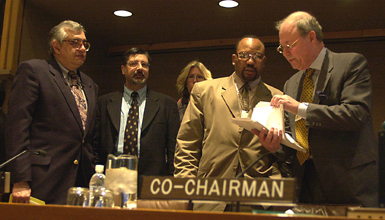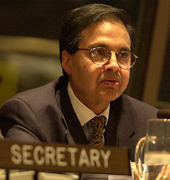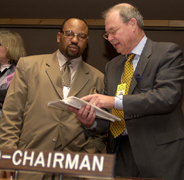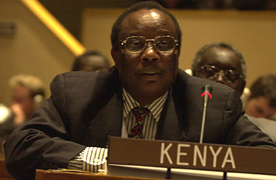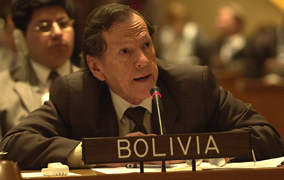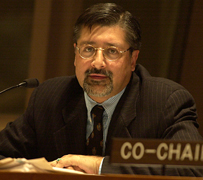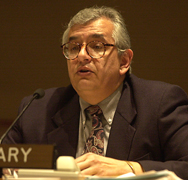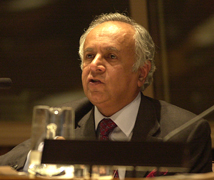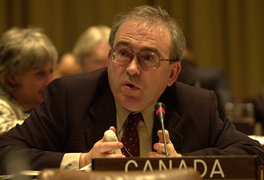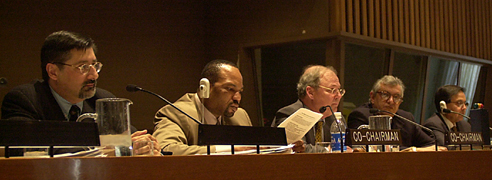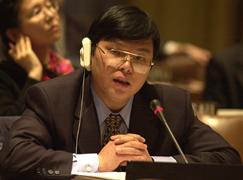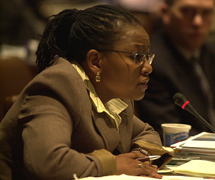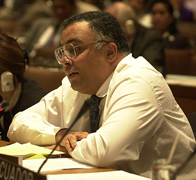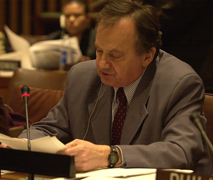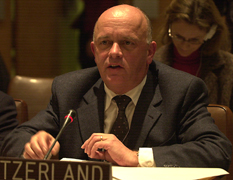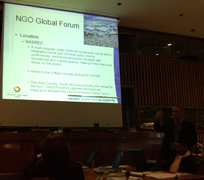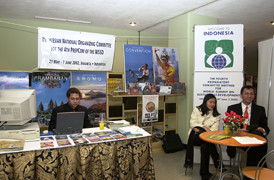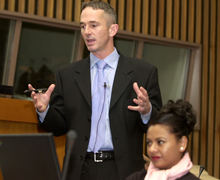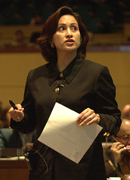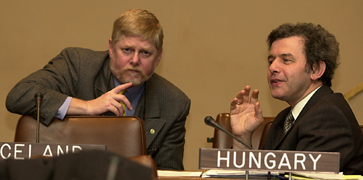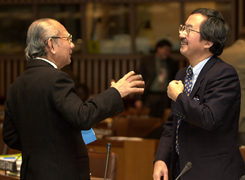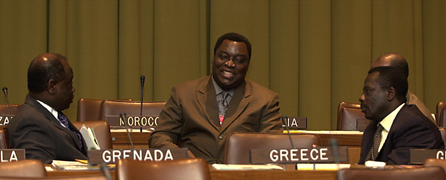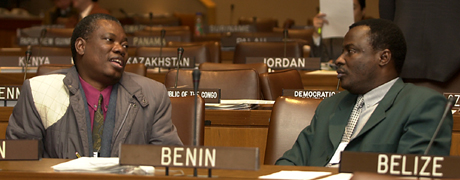|
Discussion
on Sustainable Development Governance:
Presentations from heads of UN agencies
|
 Sarbuland Khan, ECOSOC,
described reforms in ECOSOC structure and work in order
to increase coherence in the work of the regional and
functional commissions that report to it. He said that
a new approach is emerging in how to deal with conference
follow-up, one that places a premium on wide participation.
He stated that ECOSOC was the center of coordination for
sustainable development, "the fulcrum for coherence
between the UN, development finance institutions and the
WTO."
Sarbuland Khan, ECOSOC,
described reforms in ECOSOC structure and work in order
to increase coherence in the work of the regional and
functional commissions that report to it. He said that
a new approach is emerging in how to deal with conference
follow-up, one that places a premium on wide participation.
He stated that ECOSOC was the center of coordination for
sustainable development, "the fulcrum for coherence
between the UN, development finance institutions and the
WTO." |
|
|
|
Co-Chairs
Ositadanma Anaedu (Nigeria), and Lars-Goran Engfeldt
(Sweden)
|
| |
|
Kenya
asked about the relationship between the EMG
and IEG, and their futures after the WSSD.
|
|
|
Bolivia
asked about coordination with trade organizations,
such as the WTO.
|
|
| |
 Amin's answers to Kenya's and Bolivia's questions (see
above).
Amin's answers to Kenya's and Bolivia's questions (see
above).
|
| |
|
 Adnan
Amin, Director, UNEP New York Office, outlined the
history of the current international environmental governance
(IEG) process, reiterated that UNEP has brought an environmental
dimension to the CSD's work and said that IEG results
would be reported to PrepCom III. He also reiterated
that the nature of the environmental challenge is planetary
in scope, and that there is global solidarity in facing
these issues. He said over 100 Environment Ministers
were expected to be present at the final meeting of
the IEG in Cartagena. Adnan
Amin, Director, UNEP New York Office, outlined the
history of the current international environmental governance
(IEG) process, reiterated that UNEP has brought an environmental
dimension to the CSD's work and said that IEG results
would be reported to PrepCom III. He also reiterated
that the nature of the environmental challenge is planetary
in scope, and that there is global solidarity in facing
these issues. He said over 100 Environment Ministers
were expected to be present at the final meeting of
the IEG in Cartagena.
|
|
|
 Alvaro
Umana, UNDP, said clear, practical and effective
systems of sustainable development governance at the
global, regional, national and local levels were necessary
to overcome the implementation gap. He noted fragmented
sectors that compete rather than cooperate, and he called
for a new global initiative to build capacity for sustainable
development governance using innovative partnerships. Alvaro
Umana, UNDP, said clear, practical and effective
systems of sustainable development governance at the
global, regional, national and local levels were necessary
to overcome the implementation gap. He noted fragmented
sectors that compete rather than cooperate, and he called
for a new global initiative to build capacity for sustainable
development governance using innovative partnerships.
|
|
|
 Qazi
Shaukat Fareed, Director, Office of Interagency
Affairs, said its role was to monitor coordination between
the different agencies within the UN. Currently, he
said its work was being driven by substance more than
scheduling needs at this point. He also emphasized using
new technologies in a continuous dialogue between agencies. Qazi
Shaukat Fareed, Director, Office of Interagency
Affairs, said its role was to monitor coordination between
the different agencies within the UN. Currently, he
said its work was being driven by substance more than
scheduling needs at this point. He also emphasized using
new technologies in a continuous dialogue between agencies.
|
|
|
 Canada said that in his experience, ECOSOC had
achieved little in terms of coordinating sustainable development,
and perceived the Council as more of an obstacle. He worried
that issues of fragmentation will continue and that proposed
ad hoc processes won't increase coordination nor
command commitment.
Canada said that in his experience, ECOSOC had
achieved little in terms of coordinating sustainable development,
and perceived the Council as more of an obstacle. He worried
that issues of fragmentation will continue and that proposed
ad hoc processes won't increase coordination nor
command commitment. |
| |
|

